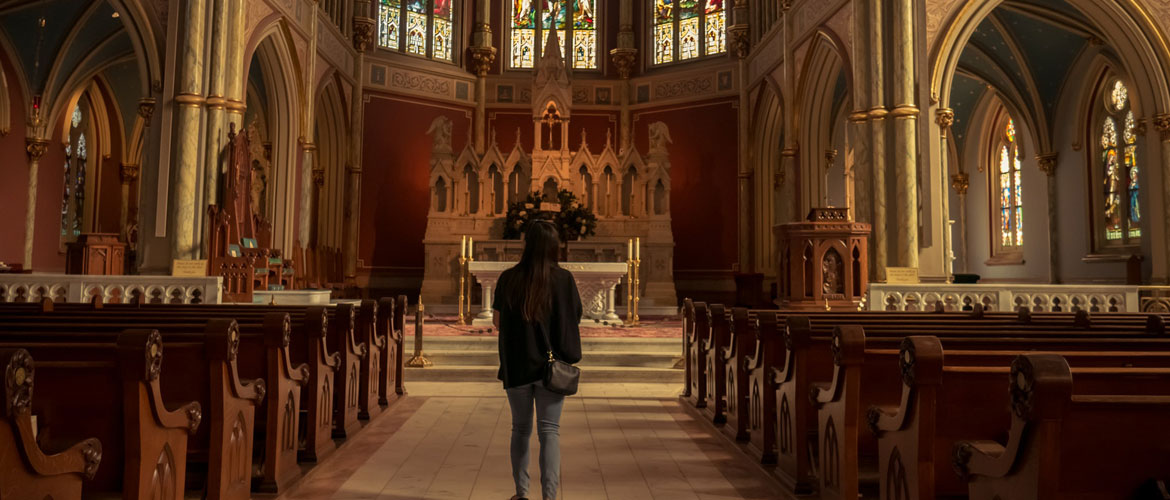What makes a church welcoming to singles?
For many unmarried people, church can feel like an unwelcoming experience. This article addresses some of the features of church life where singles, particularly those with enduring same-sex attractions (SSA), can feel marginalised.
Church programme
A church programme or website dominated by activities for families and couples can send out the message that single people are not equally valued. Try including a single person in the team that designs the church programme, with a particular brief to include activities that are going to be inviting for singles of all ages and situations. Make sure that activities for singles are not normally restricted to those within a certain age bracket (eg 20s/30s) and be careful how they are described - many people find even the label “single” stigmatising. It can be very embarrassing for people to turn up to a social with other single people to find that the event is essentially a match-making exercise.
Teaching
When singleness is referred to in church teaching, the implication can be sometimes that it is a state of incompleteness rather than a godly calling in itself. In 1 Cor 7:7, Paul describes singleness as a “gift from God”, equivalent in value to marriage. Preachers need to be careful to speak highly of singleness, recognising that some have chosen singleness as a high calling than allows the person to be devoted to serving God (1 Cor 7:32; Matt 19:12). Of course, there are also many single people who would prefer to be married but find themselves unmarried for now due to circumstances, so it’s a sensitive topic for many.
Marriage is surely a good and godly institution, and one to be encouraged, but marriage between fellow Christians will not be a feature of the life to come (Luke 20:34-36). So Bible teachers should be preparing all of us (married or single) for the ultimate marriage of the Church to Jesus (Eph 5:32).
Those facing same-sex temptations will often be sensitive to the balance of teaching on sexual sin. Where the sin of same-sex behaviour is repeatedly addressed, but other sexual sins such as marital infidelity, pornography, co-habiting etc are tolerated or down-played, the SSA person will rightly feel that this misrepresents the balance of biblical teaching.
Everyday life
When a church family just meets once a week, with minimal commitment to prayer meetings and mid-week groups, single people can feel forgotten about. In the early church, Christians “devoted themselves… to the fellowship” (Acts 2:42), they supported one another practically (Acts 2:45; Acts 4:34-5) and they met daily (Acts 2:46).
What did Jesus model in spending time with other people? Well, in Mark 3:34-5, in response to the crowd telling him that his blood family was looking for him, Jesus said “Here are my mother and my brothers! For whoever does the will of God, he is my brother and sister and mother”. Jesus was a family man, but more in the sense of his spiritual family of fellow believers than his family of origin.
Church leaders have the opportunity to set the example with hospitality to others, particularly inviting single people to join them in their home, perhaps on a regular basis. For some, this will give single people a sense of belonging in a family setting. This could be for meals, or perhaps days out, or even invitations to go on holiday together. Single people do not want to be made ‘projects’, but they are often very happy to be included in the mundane elements of everyday life in other people’s homes. Hospitality is not about impressing others with our culinary skills but simply opening up our lives and sharing them with one another.
Times that single people can particularly feel their isolation can be when they are ill or struggling with a practical matter such as DIY or finances. Many churches would organise a meal rota for a family with a new baby, but would they offer visits and practical help to those living alone when they are sick or needing support?
Role models
When the church leadership is restricted to those who are married with children, this sends out the message that “married is better” and deprives single people in the congregation of good single role models. Some churches take the lists of qualifications in the Bible for church overseers (eg 1 Tim 3:2-7) so literally that they restrict the post to those who are married. Would Paul (who wrote 1 Timothy) have excluded himself from being an overseer because he was single? Would he have excluded Jesus?! Churches should include at least one single person in the leadership, where possible, and so send out the clear signal that singleness is valued.
Conclusion
Every one of us, whether in leadership or not, can help to make our churches more inclusive of single people. We can all offer hospitality and we can all gently challenge where there is an imbalance in the teaching or activities in a church.
Resources for further study
Please note that any external resources below are intended to complement the main answer given above and may not entirely match TFT's position.






